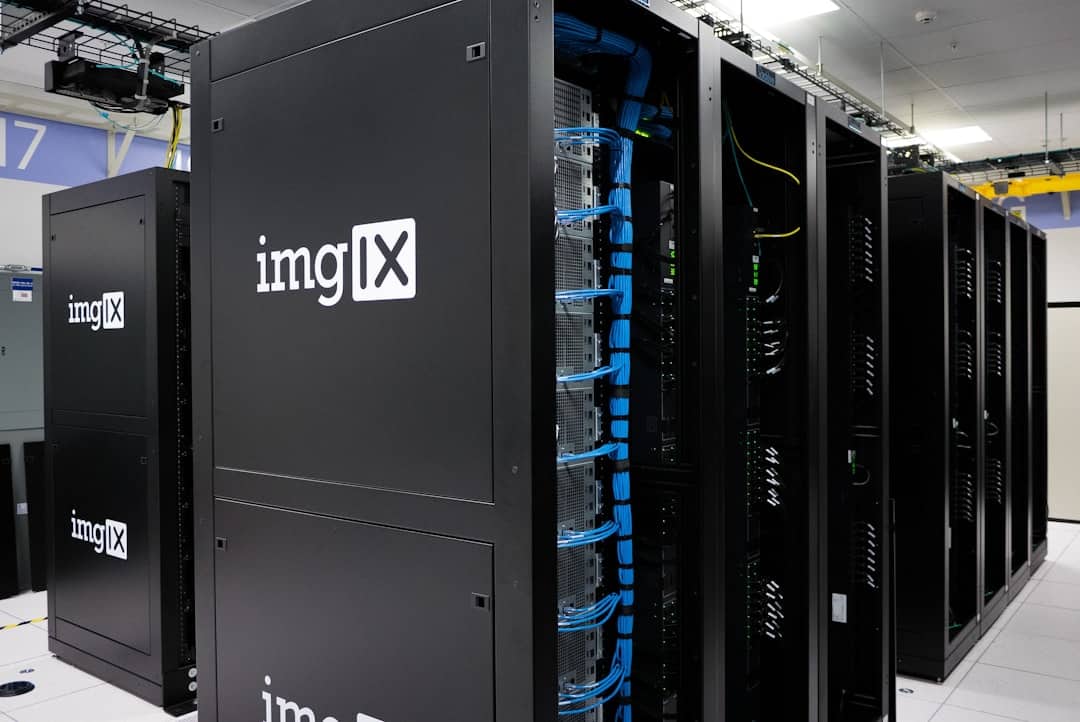Artificial Intelligence (AI) is a field of computer science focused on creating intelligent machines capable of performing tasks that typically require human intelligence. Machine learning, a subset of AI, develops algorithms enabling computers to learn from data and make predictions or decisions. This is accomplished through statistical techniques that allow machines to improve their performance on specific tasks over time.
Deep learning, an advanced form of machine learning, utilizes artificial neural networks to emulate human brain processing and learning. These networks consist of multiple layers of interconnected nodes, enabling automatic pattern and feature discovery in input data without explicit programming. Machine learning and Deep Learning are transforming problem-solving and decision-making across various sectors, including healthcare, finance, transportation, and entertainment.
These technologies have the potential to revolutionize industries by enhancing efficiency, accuracy, and productivity. As AI development progresses, understanding the fundamental principles of machine learning and deep learning is essential to maximize their potential and address associated challenges and opportunities.
Key Takeaways
- Machine learning is a subset of AI that focuses on training machines to learn from data and make predictions or decisions.
- Deep learning is a more advanced form of machine learning that uses neural networks to analyze and process data in a way that mimics the human brain.
- Machine learning plays a crucial role in advancing AI technology by enabling machines to learn from experience and improve their performance over time.
- Deep learning has the potential to revolutionize AI development by enabling machines to process and understand complex data in a more human-like manner.
- Machine learning and deep learning have applications in various industries, including healthcare, finance, and transportation, where they can be used for tasks such as predictive analytics and image recognition.
The Role of Machine Learning in Advancing AI Technology
Machine learning plays a crucial role in advancing AI technology by enabling machines to learn from data and improve their performance on specific tasks. This is achieved through the use of algorithms that can analyze and interpret large amounts of data to identify patterns, trends, and insights that would be difficult or impossible for humans to discover on their own. By continuously learning from new data, machines can adapt and improve their decision-making processes, leading to more accurate predictions and better outcomes.
One of the key advantages of machine learning is its ability to automate repetitive tasks and processes, freeing up human resources to focus on more complex and creative endeavors. This has significant implications for industries such as manufacturing, logistics, and customer service, where automation can lead to increased efficiency and cost savings. In addition, machine learning algorithms can be used to detect anomalies and outliers in data, which is particularly valuable in fields such as cybersecurity and fraud detection.
Overall, machine learning is driving innovation and progress in AI technology by enabling machines to learn from experience and improve their performance over time.
Exploring the Potential of Deep Learning in AI Development

Deep learning has emerged as a powerful tool in AI development, with the potential to revolutionize the way we approach complex problems in fields such as image and speech recognition, natural language processing, and autonomous vehicles. The key advantage of deep learning lies in its ability to automatically discover and learn from complex patterns and features in large datasets, without the need for explicit programming or human intervention. This makes it particularly well-suited for tasks that involve unstructured data, such as images, audio, and text.
One of the most exciting applications of deep learning is in the field of computer vision, where neural networks can be trained to recognize objects, faces, and scenes in images and videos with remarkable accuracy. This has significant implications for industries such as healthcare, where deep learning algorithms can be used to analyze medical images and assist in diagnosis and treatment planning. In addition, deep learning has shown great promise in natural language processing, enabling machines to understand and generate human language with increasing fluency and accuracy.
As we continue to explore the potential of deep learning, it is clear that this technology has the power to transform the way we interact with machines and process information.
Applications of Machine Learning and Deep Learning in Various Industries
| Industry | Application | Metrics |
|---|---|---|
| Healthcare | Medical image analysis, disease diagnosis | Accuracy, sensitivity, specificity |
| Finance | Fraud detection, risk assessment | False positive rate, precision, recall |
| Retail | Recommendation systems, demand forecasting | Conversion rate, customer retention, forecast accuracy |
| Manufacturing | Predictive maintenance, quality control | Downtime reduction, defect detection rate |
| Transportation | Autonomous vehicles, route optimization | Safety metrics, fuel efficiency, travel time reduction |
Machine learning and deep learning have a wide range of applications across various industries, from healthcare and finance to retail and entertainment. In healthcare, these technologies are being used to analyze medical images, predict patient outcomes, and personalize treatment plans based on individual patient data. In finance, machine learning algorithms are being used for fraud detection, risk assessment, and algorithmic trading.
In retail, these technologies are being used to personalize customer experiences, optimize supply chain management, and forecast demand. In addition, machine learning and deep learning are playing a crucial role in the development of autonomous vehicles, where they are used for object detection, path planning, and decision-making in complex environments. In entertainment, these technologies are being used for content recommendation, personalized marketing, and virtual reality experiences.
Overall, the applications of machine learning and deep learning are diverse and far-reaching, with the potential to transform industries and improve efficiency, accuracy, and productivity.
Challenges and Opportunities in Advancing AI through Machine Learning and Deep Learning
While machine learning and deep learning hold great promise for advancing AI technology, they also present a number of challenges that must be addressed in order to harness their full potential. One of the key challenges is the need for large amounts of high-quality data to train machine learning algorithms effectively. This can be particularly challenging in fields such as healthcare and finance, where data privacy and security concerns must be carefully managed.
In addition, there is a growing need for transparency and interpretability in machine learning algorithms, especially in fields such as healthcare and law enforcement where decisions can have significant real-world consequences. Furthermore, there is a need for ongoing research and development to improve the robustness and reliability of machine learning algorithms, particularly in complex and dynamic environments. Despite these challenges, there are also significant opportunities for advancing AI through machine learning and deep learning.
For example, these technologies have the potential to democratize access to information and services by enabling personalized experiences and recommendations based on individual preferences and behaviors. In addition, they have the potential to improve decision-making processes in fields such as healthcare and finance by providing insights and predictions that would be difficult or impossible for humans to discover on their own.
Ethical Considerations in the Use of AI Technology

As AI technology continues to advance through machine learning and deep learning, it is crucial to consider the ethical implications of its use in various fields. One of the key ethical considerations is the potential for bias in machine learning algorithms, which can lead to unfair or discriminatory outcomes for certain groups of people. This is particularly concerning in fields such as healthcare and law enforcement, where decisions based on machine learning algorithms can have significant real-world consequences.
In addition, there is a need to carefully manage data privacy and security concerns in the use of AI technology, particularly in fields such as healthcare and finance where sensitive personal information is involved. Furthermore, there is a need for transparency and accountability in the development and deployment of AI systems, particularly in fields such as autonomous vehicles where safety is a critical concern. Overall, it is important to consider the ethical implications of AI technology in order to ensure that its use is aligned with societal values and norms.
This requires ongoing dialogue and collaboration between technologists, policymakers, ethicists, and other stakeholders to develop guidelines and best practices for the responsible use of AI technology.
The Future of AI: Machine Learning and Deep Learning in Innovation and Research
Looking ahead, machine learning and deep learning are poised to play a central role in driving innovation and research across various fields. In healthcare, these technologies have the potential to revolutionize diagnosis and treatment planning by enabling personalized medicine based on individual patient data. In finance, they have the potential to improve risk assessment, fraud detection, and algorithmic trading by providing insights that would be difficult or impossible for humans to discover on their own.
In addition, machine learning and deep learning are expected to play a crucial role in the development of autonomous vehicles by enabling object detection, path planning, and decision-making in complex environments. Furthermore, these technologies are expected to continue advancing natural language processing by enabling machines to understand and generate human language with increasing fluency and accuracy. Overall, the future of AI through machine learning and deep learning holds great promise for driving innovation and research across various fields.
As we continue to advance in AI development, it is crucial to consider the ethical implications of its use and address the challenges it presents in order to harness its full potential for the benefit of society.
If you’re interested in the intersection of machine learning and blockchain technology, you should check out this article on how blockchain is revolutionizing various industries. It discusses how machine learning and deep learning can be used to analyze blockchain data and improve security and efficiency in the technology.
FAQs
What is machine learning?
Machine learning is a subset of artificial intelligence that involves the development of algorithms and statistical models that enable computers to improve their performance on a specific task through experience, without being explicitly programmed.
What is deep learning?
Deep learning is a subset of machine learning that uses artificial neural networks with multiple layers (hence the term “deep”) to learn from large amounts of data. It is particularly effective for tasks such as image and speech recognition.
What are the applications of machine learning and deep learning?
Machine learning and deep learning have a wide range of applications, including but not limited to:
– Image and speech recognition
– Natural language processing
– Recommendation systems
– Autonomous vehicles
– Healthcare diagnostics
– Financial forecasting
What are some popular algorithms used in machine learning and deep learning?
Popular machine learning algorithms include linear regression, decision trees, support vector machines, and k-nearest neighbors. In deep learning, popular algorithms include convolutional neural networks (CNNs) for image recognition, recurrent neural networks (RNNs) for sequence data, and generative adversarial networks (GANs) for generating new data.
What are some common tools and libraries used in machine learning and deep learning?
Common tools and libraries for machine learning and deep learning include TensorFlow, Keras, PyTorch, scikit-learn, and Theano. These tools provide a wide range of functionalities for building, training, and deploying machine learning and deep learning models.
What are the challenges in machine learning and deep learning?
Challenges in machine learning and deep learning include the need for large amounts of labeled data, the interpretability of complex models, the potential for bias in the data and models, and the computational resources required for training and inference. Additionally, ensuring the security and privacy of data used in machine learning and deep learning is an ongoing challenge.











Leave a Reply